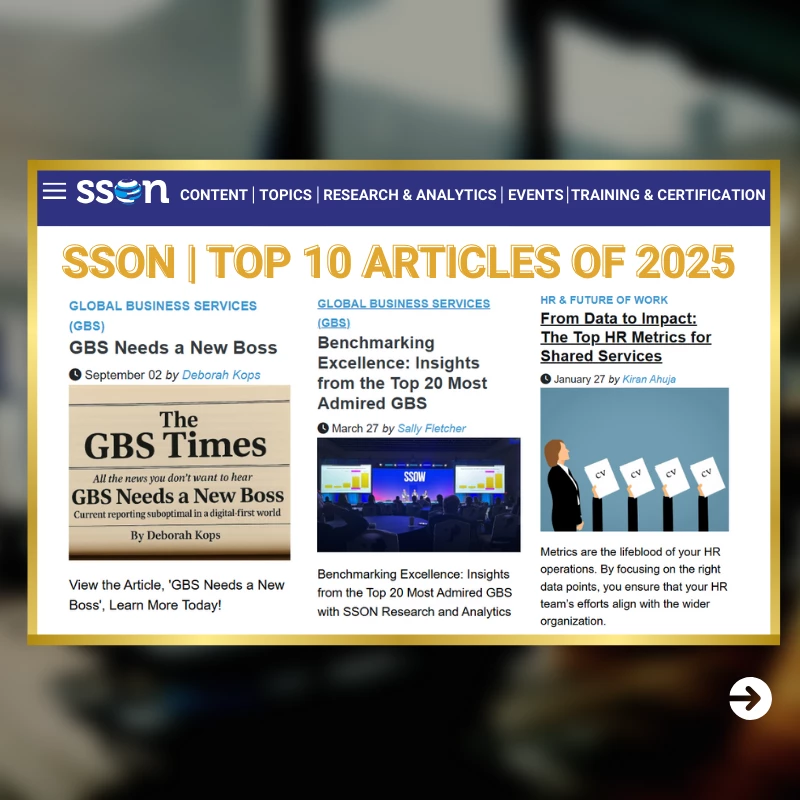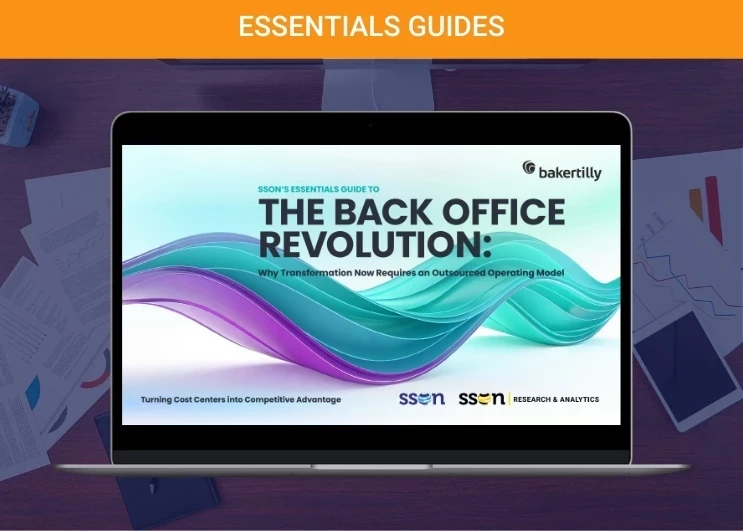SSOW Europe Key Takeaways
Add bookmark
The onsite experience at SSOW Europe this past month was the perfect place for the top thought leaders in shared services to share the knowledge and advice they had gathered over the past year.
Sally Fletcher, Head of Online Events for SSON, compiled hours of notes taken during interviews for the SSOnext podcast and throughout the conference into these 7 takeaways, all of which offer a unique lesson to any shared services and GBS professional.
360 Degree Employee Experience
With workforce concerns spanning from layoffs to talent shortages dominating headlines over the past year, many of the conversations at SSOW Europe centered around crafting a meaningful employee experience.
GBS needs to create a 360-degree employee experience that encompasses supportive automation solutions, engages employees in decision making, and increased work flexibility. By prioritizing the needs and well-being of employees, GBS can create a positive work environment that fosters engagement, productivity, and long-term success.

Purpose Day-to-Day
Defining the purpose of GBS is advantageous for employees, the organization it serves, and any stakeholders impacted by the work GBS does. At SSOW Europe conversations about purpose focused on how it can benefit both employees and digital transformation initiatives.
A clear and compelling purpose helps employees understand the broader impact and significance of their work within GBS. Employees who connect their daily tasks to a meaningful purpose are more engaged, motivated, and committed to their roles. Purpose-driven employees are more likely to embrace new initiatives, adapt to changes, and contribute their best efforts towards achieving organizational goals.
Meanwhile, digital transformation initiatives often involve significant changes in processes, technologies, and ways of working. A defined purpose acts as a guiding force during these transformations, helping employees navigate the uncertainties and challenges that arise. When employees understand the purpose behind digital transformation efforts, they are more likely to embrace new technologies, adopt new ways of working, and actively contribute to the success of these initiatives.
Capabilities as a Service
Conferences like SSOW provide attendees with a great opportunity to network and gain knowledge before returning to their home organizations with something to work towards. Many of the attendees at this year's conference wanted to learn how they could continually prove the value of GBS to the business, and the most frequently suggested solution was expanding the GBS service catalogue.
In order to provide the bespoke services organizations are seeking, GBS needs to do the following:
- Understand the organization’s strategic priorities
- Raise their ambition when it comes to incorporating new value-adding services into GBS
- Foster collaborative relationships with business units
- Leverage technologies and data analytics
- Demonstrate tangible outcomes and ROI
- Establish a continuous improvement mindset
GBS Playing a Pivotal Role in ESG
GBS has proven to be perfectly placed to track, analyze and contribute to its organization’s ESG efforts, and examples of this were on full display during SSOW Europe.
Take for example, Tesco’s GBS centre located in India. The centre was built with sustainability at the front of mind, and the successful creation of the centre has allowed Tesco GBS to set an example for the business at large on what it takes to build sustainably.
GBS’ ability to lead ESG initiatives goes well beyond its facilities management responsibilities. Its cross-functional perspective, data management capabilities, supplier management role, process optimization expertise, and employee engagement focus all make GBS a key driver of sustainable practices and ESG performance. By leveraging these capabilities, GBS can help organizations meet their ESG goals and contribute to a more sustainable and responsible business approach.
Cost 2.0
In the last 5 years, value has replaced cost-saving as the most talked about driver for shared services. However, in 2023, cost is back! Instead of cost-cutting at any 'cost' it's important that any cost savings align with corporate strategy. Discussions during SSOW Europe showed it is crucial for GBS to align their cost-cutting efforts with their business objectives for several reasons.
- Value creation: GBS should focus on generating value for the organization rather than solely reducing costs. By aligning cost-cutting with business objectives, GBS can identify areas where cost reductions can be achieved without compromising the quality of services or negatively impacting customer satisfaction.
- Risk management: Cost-cutting efforts need to be aligned with the organization's risk management strategy. GBS should assess the potential risks associated with cost-cutting measures and ensure that critical functions and processes are adequately protected.
- Operational efficiency: Aligning cost-cutting with business objectives enables GBS to identify and prioritize areas for process improvement and operational efficiency gains. Instead of implementing across-the-board cost reductions, GBS can focus on eliminating inefficiencies and redundancies that hinder the achievement of business goals.
- Employee engagement and retention: When cost cutting is aligned with business objectives, GBS can communicate the rationale behind the initiatives more effectively to its employees. This transparency helps to build trust and engage employees in the cost reduction efforts.
- Long-term viability: Finally, aligning cost-cutting with business objectives ensures the long-term viability of GBS. By focusing on strategic priorities, creating value, managing risks, improving efficiency, and engaging employees, GBS can position itself as a critical function that supports the organization's growth and competitiveness.

Mindful Automation
The vast majority of GBS organizations are well on their way in their automation journey. However, one topic on the mind of thought leaders at SSOW Europe was the need for organizations to be mindful when finding the right technology for the right processes.
GBS should carefully assess the suitability of each process for automation. Not all processes are equally suitable for automation, and attempting to automate complex or highly variable processes may lead to inefficiencies and errors. GBS should identify processes that are repetitive, rule-based, and have a high volume of transactions, as they are usually the most suitable for automation.
On the other hand, GBS also needs to choose the right automation technology that aligns with the specific needs and requirements of the processes being automated. There are various automation technologies available, such as RPA, AI, machine learning (ML), and natural language processing (NLP). Each technology has its strengths and limitations. By carefully evaluating the capabilities and limitations of different technologies, GBS can select the most appropriate one that matches the complexity and nature of the process.
GBS’s Vital Role in Company Strategy and Vice Versa
At SSOW Europe a trend consistently shared was that GBS and company strategy are more interconnected than ever, with GBS enabling the organization to achieve its goals and company strategy shaping the direction of GBS.
GBS plays a crucial role in tracking the return on investment (ROI) of strategic initiatives and investments. By implementing effective governance structures, performance metrics, and reporting mechanisms, GBS can provide valuable insights into the financial and operational outcomes of strategic projects. This enables the organization to evaluate the success of its strategic initiatives and make data-driven decisions for future investments.
GBS also helps instill a sense of purpose and alignment among its employees by connecting their work to the broader company strategy. By clearly communicating the organization's vision, mission, and strategic objectives, GBS creates a shared understanding and motivates employees to contribute to the company's success.
































